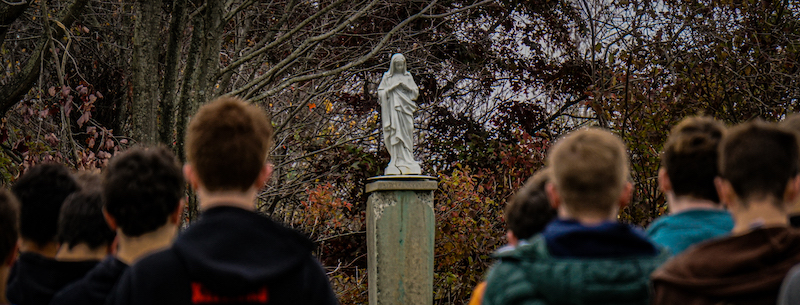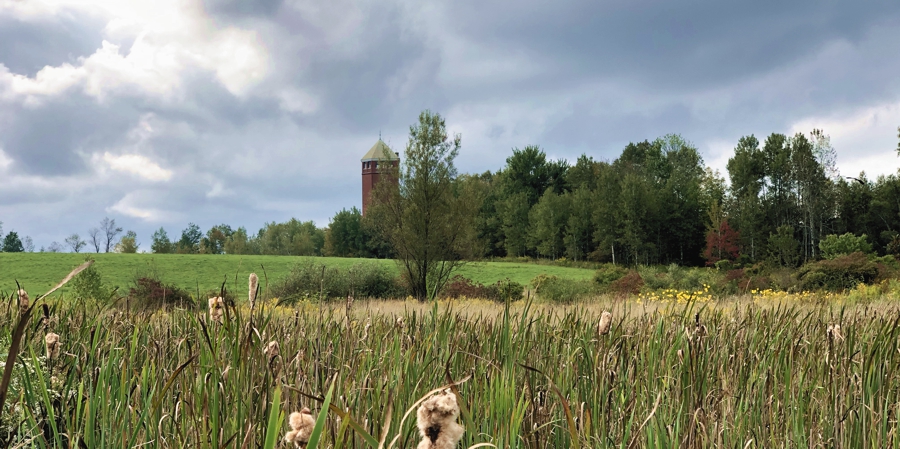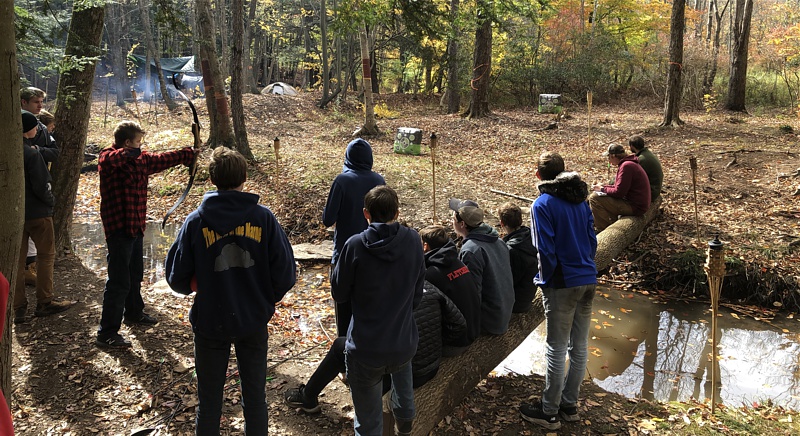
Good morning gentlemen and welcome back to Gregory the Great Academy!
I want to begin this year by telling you all what I said to the faculty about a month ago. So I thank them in advance for listening to this twice. Given the constraints of this year of Covid-19, we are going to have to hunker down at the school more than is usual for us. We will have to do more things at school, on campus, and on our own property. But I don’t see that as an altogether bad thing. It may in fact be a very good thing. I’ve heard the frustration over the years that we are sometimes doing too much, we’re too busy, we’re trying to be too many places at the same time. That may well be true.
So I propose that we embrace this opportunity to do less things, do more local things, and do them better. And as we embrace this discipline of enforced isolation, as we explore the possibilities of doing things more on the home front, I think we may also have the opportunity to explore more deeply what is essential to our education. What is truly essential? What is the essence?
This word “essential” has been bandied about much of late in the context of the new COVID World that has come upon us in order to designate just who are the essential workers and of course who are the inessential.
Well, by opening our doors wide this year, we have declared to all of your parents and to you that what we do here is essential. Most schools, I would have to say, are not essential. But some schools are. I believe that this school is one of those schools. This school is essential.
And my hope is that this year will afford us the opportunity to deepen our understanding of what is most truly essential in our education.
As radical leftists rampage through the big cities tearing down statues and setting other people’s property on fire, our call is to embrace the challenge of becoming true radicals – righteous radicals who are emboldened by Christ and his saints to go to the roots of who we are and of what we as a school ought to be doing. The word radical comes from the latin word radix, which means roos. So a righteous radical goes to the root of things, not to tear things up by the roots but to plant himself ever more deeply in the soil of the Real.
We seem to be living in a strange time. Is it an extraordinary time. I don’t know. There have been many extraordinary times in history. To me, this seems like it may very well be one of those. You feel something of the flavor of momentous change in the air, change that is by no means all for the good.
In such circumstances, it seems obvious that there is a pressing need to be strongly rooted in the things that are most true, those “dearest freshness deep down things” whatsoever those may be, that the poet Gerard Manley Hopkins speaks of in a poem many of you know.
I don’t wish to be too apocalyptic here but as the adverse forces of our culture buffet us this way and that, there is a need now more than ever for those who have the knowledge and the ability and indeed the grace to gather closer to the center so that the center can hold them in place.
As I speak of gathering closer to the center as torrential winds blow us this way and that I am thinking about lines from a poem by the great Irishman William Butler Yeats called “The Second Coming”. It’s a bit of a terrifying poem. Listen:
Turning and turning in the widening gyre
The falcon cannot hear the falconer;
Things fall apart; the centre cannot hold;
Mere anarchy is loosed upon the world,
The blood-dimmed tide is loosed, and everywhere
The ceremony of innocence is drowned;
The best lack all conviction, while the worst
Are full of passionate intensity.
Surely some revelation is at hand;
Surely the Second Coming is at hand.
The Second Coming! Hardly are those words out
When a vast image out of Spiritus Mundi
Troubles my sight: somewhere in sands of the desert
A shape with lion body and the head of a man,
A gaze blank and pitiless as the sun,
Is moving its slow thighs, while all about it
Reel shadows of the indignant desert birds.
The darkness drops again; but now I know
That twenty centuries of stony sleep
Were vexed to nightmare by a rocking cradle,
And what rough beast, its hour come round at last,
Slouches towards Bethlehem to be born?
Yeats is saying that the world is like a falcon that can no longer hear the call of his falconer, it is a world where anarchy is loosed, causing things to fall apart, allowing innocence to be drowned. And all because man has lost his center. And a man without a center, he says, even the good men, lack intensity, lack passion, lack conviction – in a word, the man of today is weak. And he’s weak because he lacks conviction. What does that mean to lack conviction? It means he’s not convinced of anything, because he has no real knowledge and experience of the center of reality, a knowledge that could root him and guide him through the storm.
So what about us? Where do we find the center here? How do we become men who are convinced of the Good, convinced of the Truth and convinced of Beauty so that we can weather the storm and help others to weather it? Where at Gregory the Great Academy do we find our center?
Music and poetry are at the center; these are at the essence of what we do here for music and poetry form the heart of man both for good and for ill. Let’s take this opportunity to explore this mystery deeper to help us to better understand and to experience the power of the muses. And let’s take this year to carry on and breath new life into one of the greatest treasures and traditions of our academy – our musical culture – by fostering an in-house musical tradition. The same goes for poetry. One of the surprise fruits of last year’s distance learning program was Mrs. Beebe’s sonnet class and the discovery that so many of our boys could learn to write profound and beautiful poetry. Let’s be a school of poets who know how to write sonnets and ballads. Let’s be a school of bards who learn as many folk songs as we can and even start writing our own folk songs.
Sports are at the center. The joy of using the body effectively to do wonderful things on the sports field both with teammates and alone. The intensity and joy of battle. These early existential confrontations on the soccer field and the rugby pitch that call one to courageous action, often for the first time in one’s life. The slow painful but satisfying knowledge that hard work builds strength, ability, and character. And perhaps best of all the sheer joy of learning to play a game well. All of this is central to our education.
The farm is a new plank that is also central. Bringing boys into contact with the realities of pigs and chickens and let’s hope sheep, goats, and cattle up ahead, roots our students on a daily basis in chores that are tied to the earth, tied to the land, and teaches them something profound about the very act of eating: that our lives are dependent on the sacrifice of many other lives. Learning to understand, participate in, and honor this sacrifice and the animals who make it – is a profound and necessary education.
And now what of academics? Are academics central to our education? I certainly hope so. But at the same time I think what makes our school extraordinary and transformative is that we understand that academics is only one of the many educational endeavors that is essential. Our school is not confined to desks and classrooms. Far from it. But what does happen in the classroom? What are we trying to achieve there? As your teachers we are trying to lead or to charm or to surprise the minds and imaginations of our students into a state of wakefulness and liveliness. We do not simply want to pack your minds with as many truths as we can fit into one class period. That kind of learning will only be disgorged onto the next exam and soon forgotten. What we want is for students to come to experience the power and profundity and joy of discovering for themselves that there is truth in history, in stories, in nature, in the very workings of the mind, in the wonderful ways that one’s mind becomes stretched and refined by writing sonnets, working out Euclidean props, and struggling to articulate ideas in speech and on paper.
Prayer is central to our education. I think to myself all the time that our school is ideal for developing the inner life of young men – because prayer forms the rhythm of every day and every activity in this place but also because here boys are given the first opportunity of their lives to begin to form their own life of prayer outside the orbit of their family. They are given a new space, new voices, new ideas, new prayers, and new liturgies with which to encounter God communally and personally.
And there is much more we could include here. What about juggling performance and craft guilds? And what of camping trips and trips to Europe? What role do they play? Are these central? I say yes. They too are essential and thus central.
At this point you may be wondering how many centers there can be. If something has too many centers, then it has no center at all. So am I speaking nonsense here?
An image that could make sense of my claim would be the image of a wheel and all of these planks that I am calling central as spokes leading from the outer rim into the center.
So with this image I think we can truly say that all of these activities that we pursue here are central, are essential because they lead us and our students to what is the true essence and center of all – to Christ.
The great Church father Saint Irenaeus wrote that “The glory of God is man alive”. Sometimes it is translated “the glory of God is the living man”. What this means is that Man glorifies God by living his life to the fullest extent and he can only live fully as man if he is formed according to the image of his maker, the image of Christ. This sentence (“The glory of God is man alive”) gives us a pithy expression of our mission. For our mission as educators is to work with one another and with God to bring ourselves and our students more fully alive through participation in the resplendent form and being of Christ. And we lead our students to encounter this font of Life through music, poetry, sport, history, literature, logic, mathematics, chores, caring for animals, juggling, and many many other essential things.
Yeats writes that the center cannot hold. He is wrong there. For the center is God who is like us a man and he can hold us if we allow ourselves to be held. If we wish to be men who are passionately and intensely good, men who can stand up to the winds of this age and even help others to stand with us, men who are true explorers and adventurers of the world God has made, let us begin here and now by learning to plant ourselves ever more deeply in the truth and beauty and goodness of God.
-Luke Culley, Headmaster



